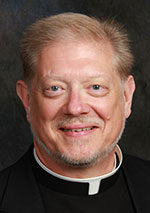That All May Be One / Fr. Rick Ginther
Ecumenism may one day lead to time when all will ‘be one’
 Welcome back! Or better yet: “I’m back!” In July, I am on hiatus from this column. Vacation is good for the body and soul. It’s now time to share in the “fruits” of rest.
Welcome back! Or better yet: “I’m back!” In July, I am on hiatus from this column. Vacation is good for the body and soul. It’s now time to share in the “fruits” of rest.
It was a gift to be able to share with our non-Christian and Christian brothers and sisters the installation prayer service and Mass for Archbishop Charles C. Thompson. The hospitality offered to them was well received!
Special thanks to the five representatives of various faith tradition who greeted Archbishop Thompson: Rabbi Brett Krichiver, senior rabbi of the Indianapolis Hebrew Congregation; Habibe Ali, interim secretary general of Islamic Society of North America in Plainfield; Bishop Jennifer Baskerville-Burrows, recently ordained and installed bishop of the Episcopal Diocese of Indianapolis; Rev. Timothy M. James, associate general minister of the Disciples of Christ; and Bishop William Gafkjen, presiding bishop of the Indiana-Kentucky Synod, Evangelical Lutheran Church of America.
These five and many others are pleased to be in relationship and dialogue with the Archdiocese of Indianapolis. And we are most pleased to be in dialogue with them.
The presence of ecumenical and interreligious representatives at an ordination or installation of a Roman Catholic bishop would have been unheard of 50 years ago. Yes, the Second Vatican Council opened the doors by inviting ecumenical and interreligious observers to be present, but the inclusion of “judicatories” of Christian denominations and interreligious representatives did not occur until the ritual books had been revised in the late 1960’s and early 1970’s.
This year is the 500th anniversary of the Protestant Reformation. It is an opportune time to reflect upon the depth of the impact of the Reformation and the Counter Reformation.
As Bishop Gafkjen has said, it is a blessing that we are commemorating this historic moment, not celebrating it—as has occurred among Lutherans even up to the last milestone, 475 years.
Rather, we are now about looking in-depth at the history—the truth, the steps, the missteps, the sinful moments among both reformers, Roman Catholic clergy, bishops, civil leaders and peasants, and the desire by all to do what they perceived was right.
Two opportunities to ponder this are approaching in the coming weeks.
First is a talk to be given by Bishop Gafkjen titled “The Meaning and Enduring Significance of the Reformation.” The lecture will be held in Lecture Hall 150 of the Evans Center on the campus of Marian University in Indianapolis at 4 p.m. on Sept. 17. This lecture is free and open to the public.
The second is a four-part series created by the magazine Christian History. This scholarly, though accessible, magazine was recommended to me by an evangelical pastor who is very involved in the ecumenical movement in our country.
I have read through three of the four parts. They are excellent, balanced and clearly good historical writing. I look forward to opening the other one. The four are:
-
Issue 115 of Christian History: “Luther leads the way.”
-
Issue 118: “The People’s Reformation: How religious upheaval birthed social revolution.”
-
Issue 120: “Calvin, Councils, and Confessions: How the Church became the churches.”
-
Issue 122: “The Catholic Reformation: Art, piety, and the fight for renewal.”
I was able to obtain all four volumes for a modest $15. It was money well spent.
As we approach the actual dates of the anniversary—on Oct. 31, 2017—may we continue to pray for the ongoing reform of hearts and minds among Christians, that one day we shall again “be one.”
(Father Rick Ginther is director of the archdiocesan Office of Ecumenism. He is also pastor of Our Lady of Lourdes Parish in Indianapolis.) †
 Welcome back! Or better yet: “I’m back!” In July, I am on hiatus from this column. Vacation is good for the body and soul. It’s now time to share in the “fruits” of rest.
Welcome back! Or better yet: “I’m back!” In July, I am on hiatus from this column. Vacation is good for the body and soul. It’s now time to share in the “fruits” of rest.